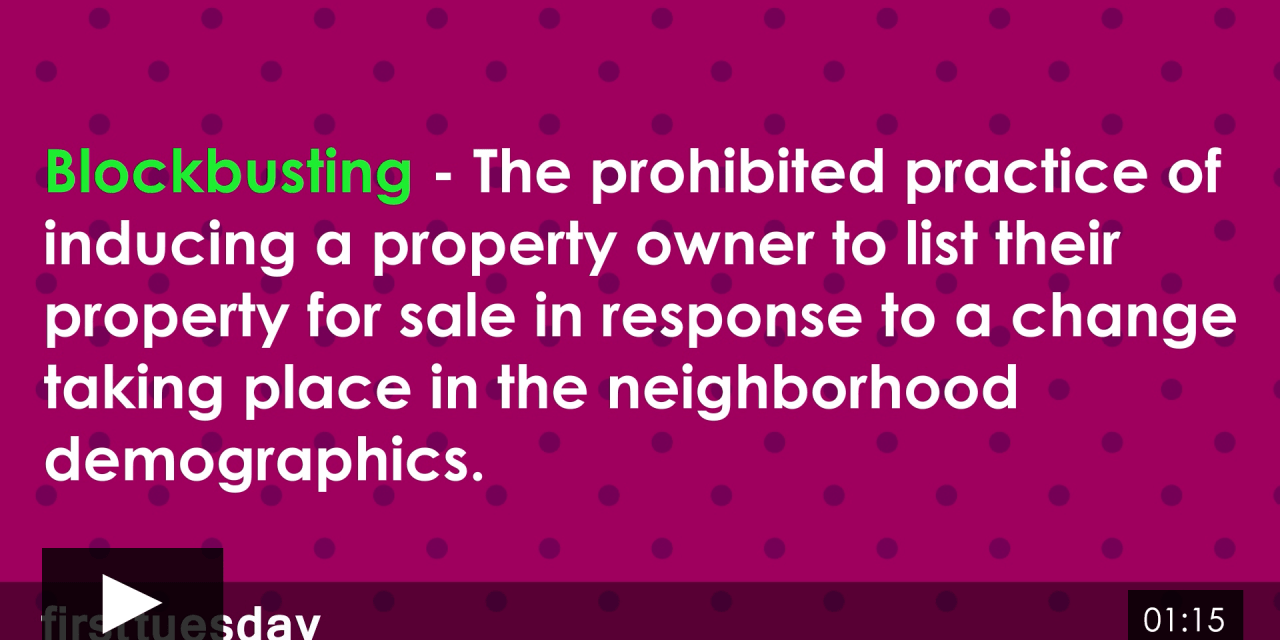What is blockbusting?
Blockbusting refers to the prohibited practice of a real estate licensee inducing a property owner to list their property for sale in response to a change taking place in neighborhood demographics.
For example, consider a real estate broker who encourages an owner to offer their home for sale below market value by insinuating a neighborhood is undergoing a change amongst its residents. The broker claims home values are about to plummet due to this projected change. The owner agrees to sell their property at a below market price to the unscrupulous broker, who later resells the property at a fair market value.
More examples of blockbusting activities include:
- encouraging an owner-occupant to offer their home for sale or rent by insinuating that a neighborhood is undergoing or is about to undergo a change in the race, color, religion, sex, handicap, familial status or national origin of its residents; or
- discouraging an owner-occupant from offering their home for sale or rent by claiming the entry of individuals of a particular race, color, religion, sex, familial status, handicap, or national origin will result in undesirable consequences for the neighborhood or community, such as an increase in criminal activity or a decline in the quality of schools and other facilities. [24 Code of Federal Regulations 100.85(c)]
Blockbusting is nearly synonymous with “panic peddling” or “panic selling,” the primary difference being that with blockbusting, agents use panic selling specifically for financial gain. However, an agent’s actual financial gain is not necessary to establish blockbusting conduct. The mere profit motivation is sufficient to establish blockbusting. [24 CFR §100.85(b)]
Related terms
Steering is defined as an unlawful housing practice that includes words or actions by a real estate licensee intended to influence the choice of a prospective buyer or tenant, in effect, steering them. It involves the restriction of an individual seeking to rent or purchase a dwelling in a community, neighborhood or development, when the guidance perpetuates segregated housing patterns. [42 United States Code §3604(d); 24 CFR §100.70]
Redlining is defined as the failure to provide financing or insurance in certain communities. It is specifically targeted by the law since it adversely affects the health, welfare and safety of California residents. Lenders who deny mortgage applications based on the characteristics of the community discourages homeownership. Hence, redlining leads to a decline in the quality and quantity of housing in areas where financing is generally unavailable. [Health & S C §35801(e)(4), Health & S C §35801]
History behind the Word
Blockbusting emerged at the beginning of the 20th century in Chicago, Illinois. It began with a process where white homeowners, living near Black communities, were urged by real estate agents and home developers to sell their homes before property values diminished.
Agents and developers would frequently hire African-American subagents as a type of agent provocateur to walk their dog or drive through the predominately white neighborhoods to provoke a sense of fear in the residents. The nefarious real estate agents were then able to secure listings from these owners and quickly sell their homes to racial minorities.
The Federal Fair Housing Act (FFHA), created in 1968, effectively ended blockbusting in any shape or form. The FFHA is a collection of policies designed to prevent discrimination in the access to housing based on an occupant’s inclusion in a protect class. The FFHA bars the use of any discriminatory actions a seller, landlord or property manager might take against a prospective buyer or tenant based on an individual’s:
- race or color;
- national origin;
- religion;
- sex;
- familial status; or
- [42 USC §3602]
The FFHA prohibits a seller, landlord or property manager from unlawfully discriminating against individuals during solicitations and negotiations for the sale or rental of a dwelling. [42 USC §3604(a)]
A landlord or property manager may not:
- refuse to rent a dwelling or to negotiate the rental of a dwelling for prohibited discriminatory reasons;
- impose different rental changes on a dwelling for prohibited discriminatory reasons;
- use discriminatory qualification criteria or different procedures for processing applications in the rental of a dwelling; or evict tenants or tenants’ guests for prohibited discriminatory reasons














